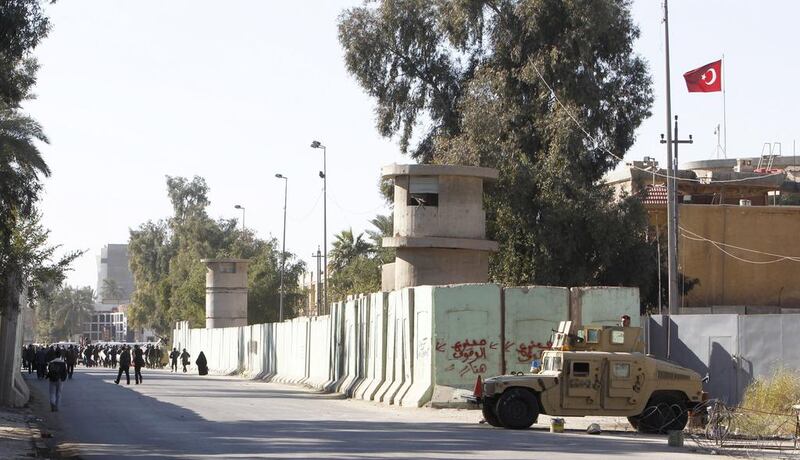Erbil // When Turkish tanks rolled across the border into Iraqi Kurdistan, Ankara thrust the autonomous region onto the centre stage of an already complex jostle of competing interests that has come to define the fight against ISIL.
Around 150 combat troops entered Iraq in tanks and armoured vehicles last week, according to the Turkish Anadolu news agency. The convoy drove to a military base near the town of Bashiqa, where the Turks are helping train a police force that is to provide security in Mosul once the city has been retaken from ISIL.
The build-up sparked an outcry from Baghdad which considered the move a violation of national sovereignty and demanded the troops withdraw.
Turkey on Tuesday reiterated its respect for Iraq’s territorial integrity and said it would stop deploying troops for now, but those already there will remain as part of the training mission.
The troops are in Iraq to protect against a possible attack from ISIL and those who interpreted their presence differently were involved in “deliberate provocation”, Turkish Prime Minister Ahmet Davutoglu said.
That Iraq is unable to enforce its borders is an intense embarrassment to its government, though unsurprising given that ISIL still controls roughly a third of the country. Beyond the humiliating headlines, Turkey’s move points to a complex web of alliances and enmity that mar Iraqi Kurdistan’s war effort.
The Kurdistan Workers’ Party (PKK), a Kurdish separatist group that has clashed with the Turkish government for decades before it retreated into the mountains of Iraqi Kurdistan, was outraged by the move.
“The main aim of sending troops to South Kurdistan is to fight the Kurdish Freedom Movement,” said Zagros Hiwa, a spokesman for the group, referring to Iraqi Kurdistan and the PKK respectively.
The PKK have grown in prominence since ISIL became a threat to the Kurdish region in 2014, playing a big part in the defence of the Sinjar area by preventing thousands of Yazidis from falling into the hands of the terror group, and fighting in other parts of the 1,000km Kurdish front. It also holds sway in Syria’s Kurdish region, where the Kurds are becoming an increasingly trusted US ally.
Turkey has bombed PKK bases in Iraq repeatedly since a ceasefire broke down earlier this year, and the group accuses Ankara of colluding with ISIL. Turkey strongly refutes such accusation and labels the PKK a terror group responsible for dozens of attacks on Turkish security forces since the ceasefire collapsed.
The Turkish build-up in Iraq is part of an effort to take control of Mosul after the extremists are flushed out, according to Mr Hiwa.
“Once ISIL ... is no longer able to hold on in Mosul, Turkey wants to invade Mosul and control it via other proxies which have nothing to do with the real interests of the peoples’ of Iraq,” said the PKK spokesman.
“We are ready to defend the democratic gains of the Kurdish people and other peoples in Iraq against the threats of ISIL and Turkey,” Mr Hiwa said.
Turkey has strong ties to Mosul, Iraq’s second largest city, and to Atheel Al Nujafi, the former governor of Nineveh province, in which Mosul lies. The Hashed Al Watani, a militia trained by the Turks at Bashiqa, was called into life by Mr Nujaifi, although it is unclear how much authority he still wields over it.
When The National visited the training camp in May, Colonel Ziad Kader, the deputy commander at the camp, said that 7,000 volunteers had been registered for a three-week training course. The recruits are mainly Sunni Arabs from Mosul and its surroundings, and will be deployed as security once the city has beenrecaptured, said Mr Kader, who worked as part of Mr Nujaifi's administration before Nineveh province was overrun by ISIL in June 2014.
The Hashed Al Watani and its Turkish instructors are endorsed by both the Iraqi government and the Kurdish Regional Government (KRG), said Safeen Dizayee, a spokesman for the latter. Mr Dizayee was unfazed about the ramped up Turkish military presence.
“Turkish troops have been here for the last 20 years or so in various places,” said the KRG spokesman. “This ... is an expansion of an ongoing training programme for Sunni Arabs in Nineveh province.”
Turkey is also close to the Kurdistan Democratic Party (KDP), which rules Iraqi Kurdistan as part of a coalition government. The KDP’s powerbase is in the north-west of the autonomous region, which now also control parts of Nineveh such as Bashiqa. The party is behind the burgeoning energy ties with Turkey, through which the KRG exports its oil contrary to Baghdad’s wishes. KDP is hostile to the PKK, whose socialist and egalitarian ideals run counter to the KDP’s more traditional outlook.
The two parties are tussling for control of the Sinjar region, which was a KDP stronghold until KRG forces ceded the area to ISIL without a fight. The PKK now has a strong military presence in Sinjar, which lies close to the border with the Kurdish region in Syria.
This has alarmed Turkey, and likely prompted it to beef up its presence in Bashiqa, experts say.
“Turkey still assesses the PKK as its main national security threat and any success the PKK enjoys will require a firm response from the Turkish government. It appears that the Turkish government views the PKK’s current role in Iraq as a success,” said Ahmed Ali, senior fellow at the American University of Iraq in Sulaimani, a city in Iraqi Kurdistan. Turkish government officials did not respond to requests for comment.
Given the small size of the contingent, the Turkish troops in Bashiqa are unlikely to seek out and engage PKK forces. Rather it will guard its training operations against a possible PKK attack.
“The troop presence, however, sends a clear signal to the PKK that Turkey does not want to see it spread its influence,” says Mr Ali.
foreign.desk@thenational.ae
* with additional reporting from Reuters





